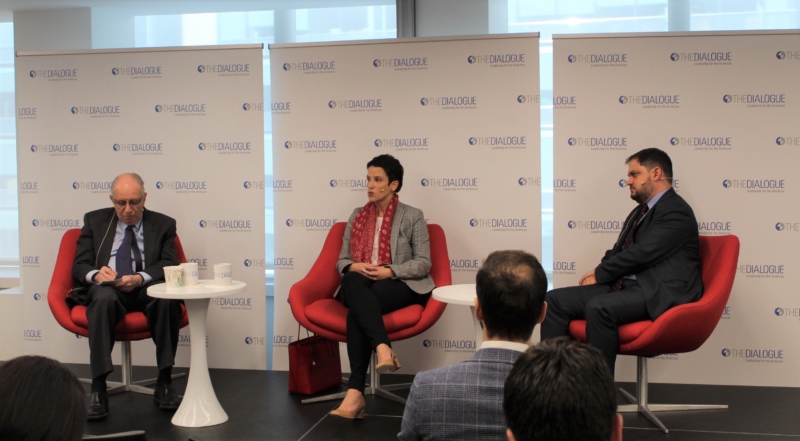Rising Brazil: The Choices Of A New Global Power
What should we expect from a newly powerful Brazil? Does the country have the capacity and leadership to be a central actor in addressing critical global and regional problems?
On March 13 the Inter-American Dialogue and Johns Hopkins University School of Advanced International Studies (SAIS) hosted a discussion on the Trump Bolsonaro summit, and what we can expect from the relationship between the new Brazilian administration and the United States. Dialogue president Michael Shifter delivered opening remarks, Dialogue president emeritus Peter Hakim moderated the discussion which featured Associate Professor of International Relations at Fundação Getúlio Vargas, Matias Spektor and Monica de Bolle, Director of the Latin American Studies Program at Johns Hopkins School of Advanced International Studies.
Hakim began by remarking on the prospective importance of the Trump Bolsonaro summit. Bolsonaro and Trump have an affinity for each other, and it sends a message that after spending the first month of his presidency hospitalized, Bolsonaro would choose to visit the US as one of his first acts of governance.
De Bolle spoke about Brazil's need for big government reform as it the country is facing a liquidity crisis. She argued that the first step towards reform is pension reform, which had been a big challenge for previous governments. This will most likely be the same for Bolsonaro’s proposed “aggressive” reform. She was not optimistic about the meeting which she described as a great opportunity for optics but not much else.
Spektor disagreed with de Bolle, attributing crucial importance to the meeting for Bolsonaro, arguing that precisely because Bolsonaro was about to embark in a complex process of reform he would need American support. Having analyzed Brazilian re-election campaigns in the past, Spektor backed his claims by saying that Bolsonaro would not be able to print money to cover the deficit as this would trigger inflation and that Brazilian presidents that govern through recessions do not get re-elected. Therefore, Bolsonaro must look to other methods for funding the reform process. Spektor believed that the meeting would help Bolsonaro project an image of strength to unify his heterogeneous base.
The panelists touched upon other foreign policy issues such as Brazil’s challenges with drug trafficking through its porous borders. De Bolle argued that Trump’s push to limit China’s influence in Latin America will be stronger than Bolsonaro's position on China. Spektor suggested that Bolsonaro would take a stronger stance toward Venezuela than toward China because of differing stances of his cabinet on how to approach China.
What should we expect from a newly powerful Brazil? Does the country have the capacity and leadership to be a central actor in addressing critical global and regional problems?
President Lula da Silva triumphantly announced that he and his Turkish counterpart had persuaded Iran to shift a major part of its uranium enrichment program overseas—an objective that had previously eluded the US and other world powers. Washington, however, was not applauding.
An upcoming meeting between Presidents Obama and Rousseff should not be expected to produce dramatic news or unexpected major breakthroughs.
 Irene Estefania Gonzalez/Inter-American Dialogue
Irene Estefania Gonzalez/Inter-American Dialogue